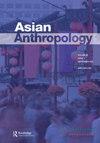Food contact zones and kitchen politics: migrant domestic helpers in Hong Kong
Q2 Social Sciences
引用次数: 2
Abstract
Abstract Making and sharing food plays an essential role in foreign domestic helpers’ work and leisure life. However, this has seldom been addressed in the voluminous migrant domestic helper literature. In Hong Kong, overseas helpers are employed in over three hundred thousand households. This article explores their food experiences in both their leisure and work spaces. It first examines the “contact zones” in which these workers share food with co-ethnics. It then considers the kitchen space in which foreign domestic workers serve their employers. It shows how these domestic helpers make use of their culinary skills to secure better human relationships and gain extra bargaining power through the provision of tasty ethnic dishes. Despite the immense power imbalance between the employer and the domestic helper, such food contact has shed light on the everyday resilience embedded in kitchen politics in Hong Kong.食物接触区与厨房政治:香港的外籍家庭佣工
制作和分享食物在外籍家庭佣工的工作和休闲生活中扮演着重要的角色。然而,这在大量的流动家庭佣工文献中很少得到解决。在香港,有超过30万个家庭雇用海外佣工。这篇文章探讨了他们在休闲和工作场所的食物体验。它首先考察了这些工人与同种族的人分享食物的“接触区”。然后考虑外籍家庭佣工为雇主服务的厨房空间。它展示了这些家庭佣工如何利用他们的烹饪技巧来确保更好的人际关系,并通过提供美味的民族菜肴获得额外的议价能力。尽管雇主和家庭佣工之间存在巨大的权力不平衡,但这种食物接触揭示了香港厨房政治中嵌入的日常弹性。
本文章由计算机程序翻译,如有差异,请以英文原文为准。
求助全文
约1分钟内获得全文
求助全文
来源期刊

Asian anthropology
Social Sciences-Anthropology
CiteScore
1.60
自引率
0.00%
发文量
25
期刊介绍:
Asian Anthropology seeks to bring interesting and exciting new anthropological research on Asia to a global audience. Until recently, anthropologists writing on a range of Asian topics in English but seeking a global audience have had to depend largely on Western-based journals to publish their works. Given the increasing number of indigenous anthropologists and anthropologists based in Asia, as well as the increasing interest in Asia among anthropologists everywhere, it is important to have an anthropology journal that is refereed on a global basis but that is editorially Asian-based. Asian Anthropology is editorially based in Hong Kong, Taiwan, and Japan, but welcomes contributions from anthropologists and anthropology-related scholars throughout the world with an interest in Asia, especially East Asia as well as Southeast and South Asia. While the language of the journal is English, we also seek original works translated into English, which will facilitate greater participation and scholarly exchange. The journal will provide a forum for anthropologists working on Asia, in the broadest sense of the term "Asia". We seek your general support through submissions, subscriptions, and comments.
 求助内容:
求助内容: 应助结果提醒方式:
应助结果提醒方式:


